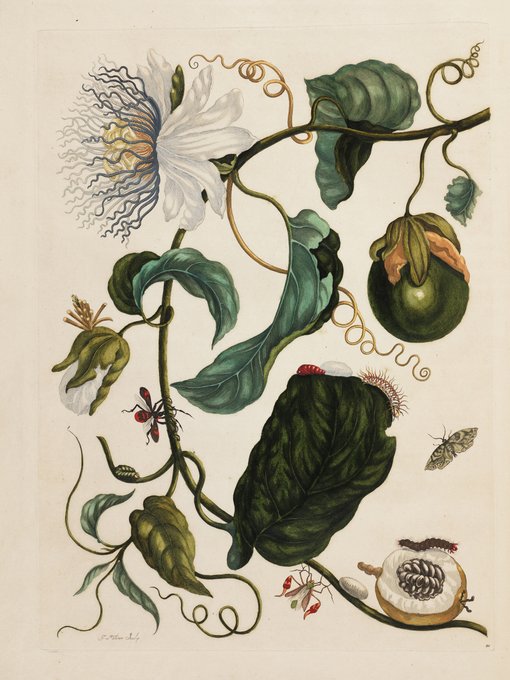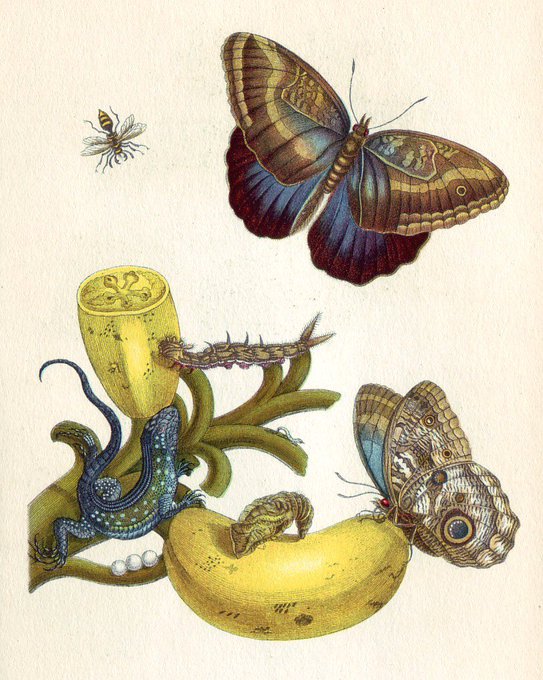sibyllaのTwitterイラスト検索結果。 364 件中 10ページ目
A Green Plover, Maria Sibylla Merian, 17th-18th century https://t.co/aroZiI49sb #mariasibyllamerian #harvardartmuseums
Wonderful, richly illustrated blogpost by @KayEtheridge on her recent book publication "The Flowering of Ecology: Maria Sibylla Merian’s Caterpillar Book"
https://t.co/q0Y5YI8SGN
#naturalhistory #mariasibyllamerian #historyofscience #entomology @NoteArtHerstory
@KayEtheridge (@gettysburg Biology Dept) contributes a new guest post to the #ArtHerstory blog!
Curiosity & the Caterpillar: #MariaSibyllaMerian’s Artistic Entomology, https://t.co/4ooGfecco4
#womenartists #hernaturalhistory
Maria Sibylla Merian, Violets and Honeysuckle from Erucarum ortus, alimentum et paradoxa metamorphosis, published 1717
Johanna Herolt (c.1668-1721) fue la hija de nuestra naturalista favorita: Maria Sibylla Merian (1647-1717).
Algunas de sus obras están co-firmadas por ambas, pero muchas de ellas se atribuyeron erróneamente a su madre. Al igual que Merian, estaba fascinada por la metamorfosis.
Today is #NationalTulipDay in the Netherlands! Is there a more glorious #tulip than this one: #MariaSibyllaMerian's A Parrot Tulip, Auriculas, & Red Currants, w/ a Magpie Moth, its Caterpillar & Pupa, https://t.co/M87Oor74OL
Pls share your favorite tulips by #womenartists!
Maria Sibylla Merian 🎨
From Transformations of the insects of Surinam - 1705
#botanical 🍃 🦋 #illustrations 🍃 🦋
On the occasion today (Jan 13) of the anniversary of Merian's death, we re-publicize the #ArtHerstory guest post
"The Protofeminist Insects of #GiovannaGarzoni & #MariaSibyllaMerian," by Emma Steinkraus, of @HSC1776:
[https://t.co/mMjgQPzrmV]
#hernaturalhistory #womensart
Pioneering artist Maria Sibylla Merian passed away #otd in 1717. She drew this beautiful picture during her stay in Surinam, after which it was engraved and printed in her book Metamorphosis insectorum Surinamensium. Enjoy the book here: https://t.co/WJu8KJK6Dn
It feels like something bad has happened today but I don’t know what yet because teaching Maria Sibylla Merian with these sources has been really good.
An English translation of Maria Sibylla Merian’s 1679 ‘caterpillar’ book, “Der Raupen wunderbare Verwandelung und sonderbare Blumen–Nahrung”. Kay Etheridge analyzes the 1679 caterpillar book from the viewpoint of a biologist. https://t.co/atCIpQ1t2B
#MuseumsUnlocked #Collectors Maria Sibylla Merian began collecting and studying insects at age 13. Working from live specimens, she depicted the stages of caterpillar metamorphosis. Her illustrations are held by @RCT among others https://t.co/g8AvhuovDG #MuseumsUnlocked
“Art and nature shall always be wrestling until they eventually conquer one another so that the victory is the same stroke and line: that which is conquered, conquers at the same time.”
- Maria Sibylla Merian
See also the @LinneanSociety's webpage about #MariaSibyllaMerian, which includes a 3-minute animated video about the artist's contributions to science: https://t.co/odi1hxPNxr
Maria Sibylla Merian 🎨
The New Book of Flowers (1675-1680)
#botanical #illustration
German-born naturalist and scientific illustrator—and pioneer—Maria Sibylla Merian (1647-1717).
Rumor has it that @DanielKronauer's new book on army #ants includes an illustration from our History of Science Collection, specifically this image from Maria Sibylla Merian's Metamorphosis insectorum Surinamensium (1705).
🐜📚🐜
https://t.co/8bzw7IQTRQ
#histSTM #sciart https://t.co/kV5zrdsBP6

























































